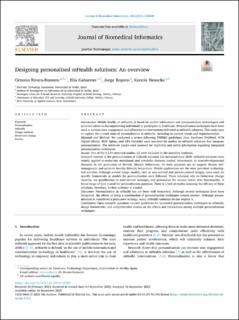| dc.description.abstract | Introduction: Mobile health, or mHealth, is based on mobile information and communication technologies and provides solutions for empowering individuals to participate in healthcare. Personalisation techniques have been used to increase user engagement and adherence to interventions delivered as mHealth solutions. This study aims to explore the current state of personalisation in mHealth, including its current trends and implementation.
Materials and Methods: We conducted a review following PRISMA guidelines. Four databases (PubMed, ACM Digital Library, IEEE Xplore, and APA PsycInfo) were searched for studies on mHealth solutions that integrate personalisation. The retrieved papers were assessed for eligibility and useful information regarding integrated personalisation techniques.
Results: Out of the 1,139 retrieved studies, 62 were included in the narrative synthesis. Research interest in the personalisation of mHealth solutions has increased since 2020. mHealth solutions were mainly applied to endocrine, nutritional, and metabolic diseases; mental, behavioural, or neurodevelopmental diseases; or the promotion of healthy lifestyle behaviours. Its main purposes are to support disease selfmanagement and promote healthy lifestyle behaviours. Mobile applications are the most prevalent technological solution. Although several design models, such as user-centred and patient-centred designs, were used, no specific frameworks or models for personalisation were followed. These solutions rely on behaviour change theories, use gamification or motivational messages, and personalise the content rather than functionality. A broad range of data is used for personalisation purposes. There is a lack of studies assessing the efficacy of these solutions; therefore, further evidence is needed.
Discussion: Personalisation in mHealth has not been well researched. Although several techniques have been integrated, the effects of using a combination of personalisation techniques remain unclear. Although personalisation is considered a persuasive strategy, many mHealth solutions do not employ it.
Conclusions: Open research questions concern guidelines for successful personalisation techniques in mHealth, design frameworks, and comprehensive studies on the effects and interactions among multiple personalisation techniques. | en_US |

